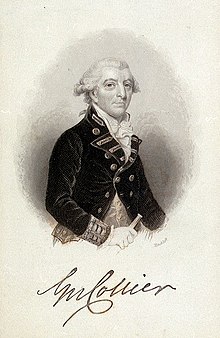George Collier
| Sir George Collier | |
|---|---|

Sir George Collier
|
|
| Born | May 11, 1738 London |
| Died | April 6, 1795 (aged 56) London |
| Allegiance |
|
| Service/branch |
|
| Years of service | 1751 – 1795 |
| Rank | Vice-Admiral |
| Commands held |
HMS Boulogne HMS Edgar HMS Tweed HMS Levant HMS Flora HMS Rainbow HMS Canada HMS St George Nore Command |
| Battles/wars |
Battle of Machias Chesapeake raid Penobscot Expedition Relief of Gibraltar |
| Awards | Knight Bachelor |
| Relations | Francis Augustus Collier (son) |
Vice Admiral Sir George Collier (11 May 1738 – 6 April 1795) was an officer of the Royal Navy who saw service during the Seven Years' War, the American War of Independence and the French Revolutionary Wars. As commander of the 4th-Rate Ship HMS Rainbow, he was one of the most successful British naval commanders during the opening stages of war with America. He achieved considerable success as one of the senior officers on the North American coast, conducting and organizing several highly effective raids and counter-strikes. He was superseded however, and returned to Britain to play a role in the closing events of the war in European waters, before moving ashore to start a political career. He enjoyed a brief return to service with the resumption of war with France, and achieved flag rank, but died shortly afterwards.
George Collier was born on 11 May 1732 in Honiton, Devon, elder son of George Collier and Henrietta unknown. He was baptised Francis Lewis George, son of George and Henrietta Collier, on 21 May 1732 in Westminster, London. (See Westminster baptism records). On 9 January 1754 he passed the required examination and was appointed Lieutenant being 'over 21'. (It would appear that the previous erroneous date of birth has been copied and copied until it has been accepted as truth). . He was born into a middle-class family and entered the Royal Navy in 1751. He served initially on the Home station, and in the East Indies with Sir George Pocock during the Seven Years' War. He was promoted to commander on 6 August 1761, and then to post-captain on 12 July 1762 with the frigate HMS Boulogne as his first command. With the conclusion of the Treaty of Paris and the end of the Seven Years' War, the Boulogne was paid off and Collier was given command of the Plymouth guardship HMS Edgar, where he would remain for the next three years. The command of a series of frigates followed in quick succession, HMS Tweed, HMS Levant and HMS Flora.
...
Wikipedia
